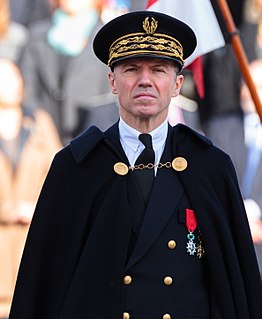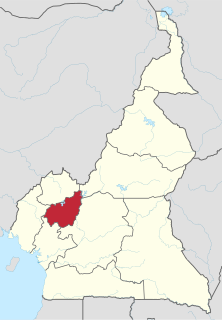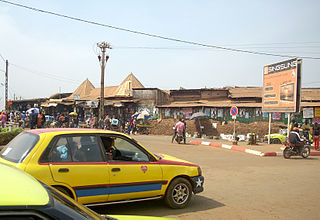
Cameroon, officially the Republic of Cameroon, is a country in west-central Africa. It is bordered by Nigeria to the west and north; Chad to the northeast; the Central African Republic to the east; and Equatorial Guinea, Gabon and the Republic of the Congo to the south. Its coastline lies on the Bight of Biafra, part of the Gulf of Guinea and the Atlantic Ocean. Due to its strategic position at the crossroads between West Africa and Central Africa, it has been categorized as being in both camps. Its nearly 27 million people speak 250 native languages.
At the crossroads of West Africa and Central Africa, the territory of what is now Cameroon has seen human habitation since some time in the Middle Paleolithic, likely no later than 130,000 years ago. The earliest discovered archaeological evidence of humans dates from around 30,000 years ago at Shum Laka. The Bamenda highlands in western Cameroon near the border with Nigeria are the most likely origin for the Bantu peoples, whose language and culture came to dominate most of central and southern Africa between 1000 BCE and 1000 CE.

Prefect is a magisterial title of varying definition, but essentially refers to the leader of an administrative area.

Paul Biya is a Cameroonian politician who has served as the president of Cameroon since 6 November 1982. He is the second-longest-ruling president in Africa, the oldest head of state in Africa, and the longest-ruling non-royal leader in the world.

Ahmadou Babatoura Ahidjo was a Cameroonian politician who was the first President of Cameroon, holding the office from 1960 until 1982. Ahidjo played a major role in Cameroon's independence from France as well as reuniting the French and English-speaking parts of the country. During Ahidjo's time in office, he established a centralized political system. Ahidjo established a single-party state under the Cameroon National Union (CNU) in 1966. In 1972, Ahidjo abolished the federation in favor of a unitary state.
Nzo Ekangaki was a Cameroonian political figure. He served as the Secretary-General of the Organisation of African Unity (OAU) from 1972 to 1974.

Ambazonia, officially the Federal Republic of Ambazonia, also referred to as Amba Land, is an unrecognised breakaway state in West Africa constituting the Northwest Region and Southwest Region of Cameroon, part of the British mandate territory historically known as the Southern Cameroons. No country has formally recognized Ambazonia's independence, and it is currently the site of an armed conflict between Ambazonian separatists and the Cameroonian military known as the Anglophone Crisis. Ambazonia is located in the west of Cameroon and southeast of Nigeria on the Gulf of Guinea.

The West Region is 14,000 km2 of territory located in the central-western portion of the Republic of Cameroon. It borders the Northwest Region to the northwest, the Adamawa Region to the northeast, the Centre Region to the southeast, the Littoral Region to the southwest, and the Southwest Region to the west. The West Region is the smallest of Cameroon's ten regions in area, yet it has the highest population density.

Bafoussam is the capital and largest city of the West Region of Cameroon, in the Bamboutos Mountains. It is the 3rd most important (financially) city in Cameroon, after Yaoundé and Douala. The communauté urbaine of Bafoussam, is a decentralized territorial collectivity. Originally called Urban Commune of Bafoussam, the communauté urbaine of Bafoussam, was born after the Presidential Decree N ° 2008/022 of January 17, 2008 and composed of three communes, namely: the Commune of Bafoussam I, the Commune of Bafoussam II (Baleng) and the Commune of Bafoussam III (Bamougoum).

Andre-Marie Mbida was a Cameroonian statesman, a nationalist, the first Cameroonian to be elected Member of Parliament at the French National Assembly, a Prime Minister of Cameroon, the second African-born Prime Minister in Sub-Saharan Africa, the first Head of State of French-speaking autonomous Cameroon from 12 May 1957 to 16 February 1958, and the first political prisoner of independent Cameroon from 29 June 1962 to 29 June 1965.

Henri Eyebe Ayissi is a Cameroonian politician and diplomat who served in the government of Cameroon as Minister of Foreign Relations from 2007 to 2011. He was Minister-Delegate at the Presidency for the Higher Audit Office from 2011 to 2015 and has been Minister of Agriculture since 2015.

The following outline is provided as an overview of and topical guide to Cameroon:
Jean-Baptiste Beleoken is a Cameroonian politician who served in the government of Cameroon as Minister of State Property and Land Tenure from 2009 to 2011. During the 1970s, he served successively as Cameroon's Ambassador to the Soviet Union, as Ambassador to the People's Republic of China, and as Ambassador to West Germany; subsequently he was Director of State Protocol from 1980 to 1989. After a long absence from state affairs, Beleoken returned to the political scene as Director of the Civil Cabinet of the Presidency from 2005 to 2009; he was then appointed to the government as Minister of State Property and Land Tenure in June 2009, remaining in the latter post until December 2011.
Ousmane Mey is a Cameroonian political figure who was Governor of the North Province of Cameroon from 1972 to August 1983. As of 2007, he is Chairman of the Board of the National Social Insurance Fund (CNPS).

Relations between Cameroon and Nigeria were established in 1960, the same year that each country obtained its independence. Since then, their relationship has revolved in large part around their extensive shared border, as well as the legacy of colonial arrangements under which areas of Cameroon were administered as part of British Nigeria. The countries came close to war in the 1990s in the culmination of a long-running dispute over the sovereignty of the Bakassi peninsula. In the 21st century, however, a return to conviviality has been achieved, partly because the demarcation of their border has been formalised, and partly because the Boko Haram insurgency in the Lake Chad basin has necessitated increasingly close cooperation in regional security matters.

The Republic of Cameroon is a decentralized unitary state.

French Cameroon or French Cameroons was a French mandate territory in Central Africa. It now forms part of the independent country of Cameroon.
The University of Dschang is located in the town of Dschang, West Cameroon, about 425 kilometers northwest of Yaoundé. It has its roots in three agricultural training schools, and evolved from an agricultural institution to a university in 1993.
The Bamileke War, often known as Guerre du Cameroun, Guerre Cachée, or the Cameroonian Independence War, is the name of the independence struggle between Bamileke Cameroon's nationalist movement and France. The movement was spearheaded by the Cameroonian Peoples Union (UPC). Even after independence, the rebellion continued, shaping contemporary politics. The war began with riots in 1955 and continued after Cameroon gained independence in 1960. Following independence, the first President of Cameroon, Ahmadou Ahidjo requested continued French military intervention to fight the UPC rebels. The UPC rebellion was largely crushed by the Cameroonian Armed Forces and French Army by 1964. This war is often forgotten because it occurred at the height of France's biggest colonial independence struggle, the Algerian War.
The Anglophone problem, as it is commonly referred to in Cameroon, is a socio-political issue rooted in Cameroon's colonial legacies from the Germans, British, and the French.











